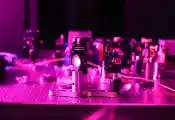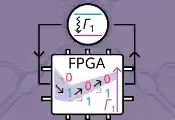The European Commission and Chips JU Select PIXEurope Consortium to Lead the European Pilot Line on Advanced Photonic Integrated Circuits
November 24, 2024 -- Every year, the needs of the digital society increases significantly, evidenced by the global market for photonic integrated circuits (PICs) production, which is expected to grow by more than 400% in the next 10 years. By the end of the decade, the global photonics market is expected to exceed 1,500 billion euros, a figure comparable to the entire annual gross domestic product of Spain, and of which photonic chips currently represent only a small percentage.
This remarkable growth is due to the prevailing need and demand for devices for applications in areas such as telecommunications, artificial intelligence, image sensing, automotive and mobility, medicine and healthcare, environmental care, renewable energy, defense and security, and a wide range of consumer applications sectors. The necessary features and specifications for such applications are provided by the combination of microelectronic chips and photonic chips. The former are responsible for information processing by manipulating electrons within circuits based on silicon and its variants, while the latter uses photons in the visible and infrared spectrum ranges in a wide variety of materials.
Within the framework of the European Chips Strategy, the so-called European Chips Act, the European Commission has announced the creation of PIXEurope, a new European pilot line for photonic chips that aims to offer cutting-edge technological platforms, transforming and transferring innovative and disruptive integrated photonics processes and technologies to accelerate their industrial adoption. The objective is the creation of European-owned/made technology in a sector of capital importance for technological sovereignty, and therefore for the creation and maintenance of the corresponding jobs in the Union.
The European Commission has selected this programme as its 5th pilot line and has chosen the proposal led by ICFO, the Institute of Photonic Sciences (based in Barcelona), to coordinate it at continental level. The pilot line consortium also involves participating entities from Austria, Belgium, Finland, France, Ireland, Italy, Poland, Portugal, the Netherlands and the United Kingdom. The pilot line is co-financed by the Ministry for Digital Transformation and the Civil Service of the Government of Spain and supported by the Generalitat of Catalonia.
Within Spain, entities from the autonomous communities of Catalonia, Valencia, Madrid and Galicia are directly participating, and the entire national community in the sector will benefit. These institutions are:
- Institut de Ciències Fotòniques (ICFO) - Coordinator
- Universitat Politècnica de Valencia (UPV)
- Microelectrónica Barcelona, IMB-CNM (CSIC)
- Universidad Carlos III Madrid (UC3M)
- Universidade de Vigo (UVigo)
Over the next 10 years and during the operational phase, the pilot line will boost the production capacity and innovation potential of European companies to a new level, allowing them to develop and manufacture prototypes of their products based on photonic chips. It will support research organizations in bridging the gap between the laboratory and the factory exploiting novel scientific results and accelerating the commercialization of this research, in particular by supporting the creation of new start-ups.
In particular, the pilot line will contribute to the design and development of an optimized manufacturing chain, involving end-users and industry partners for the evaluation of production processes to be transferred to industrial scale, with the ultimate aim of creating a unique European PICs ecosystem, with open access services to the user, establishing itself as the first fully integrated open access PICs pilot line in the world.
Valerio Pruneri, ICREA Professor, ICFO Group Leader and Director of the pilot line, highlights that “PIXEurope is the first Photonic Chip Pilot Line in Europe that unifies diverse materials, processes, and integration techniques that will allow the development and demonstration of devices and systems for all applications where Photonics is a key technology.”
In addition, Peter O’Brien, Head of Packaging at the Tyndall Institute in Ireland, has mentioned that he is “delighted to collaborate in PIXEurope, bringing Tyndall’s expertise in advanced packaging to help the Pilot Line build the full technology supply chain. Europe needs to scale-up its integrated photonic capabilities and the PIXEurope consortium is set to address this grand challenge”.
Finally, Kevin Williams, Chair of the Photonic Integration group at the Technical University of Eindhoven in the Netherlands is particularly pleased that "PIXEurope will facilitate the wide adoption of advanced photonic integrated circuits produced using the standardised design kits and foundry processes pioneered in Europe. Advanced photonic chips will offer game changing advances in speed, power-efficiency and precision."




































